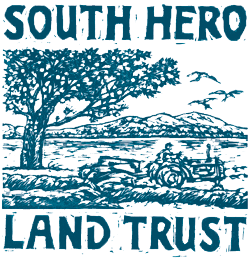Asking Questions Is What Matters...
Chuck Hulse has a passion for nature. A resident of South Hero, you may have passed him on your morning commute, standing knee-deep in a pond on Landon Road, where he goes to survey for amphibians. Or maybe you’ve met him on one of our naturalist hikes. When it comes to natural history or conservation, there are few people more enthusiastic than Chuck. But you may be surprised to learn that Chuck is not a professional naturalist. In fact, he was dissuaded from the field at an early age, but his passion and determination kept him focused throughout his journey in life. His story tells us that it’s never too late to follow your passion.
Naturalist Sean Beckett, a regular teacher in our Naturalist Walks Program, explores the world of "things with wings" at Round Pond Natural Area.
Chuck grew up in a beach town on Long Island, NY. He was always happiest outside. As a kid he “would go down to where the saltwater meets the freshwater to watch the eels come in and grab a whole handful. Nobody else knew about them, but if you went there they were as clear as day, a miracle hidden in plain sight.” Chuck loved catching frogs in the pond, listening to birds, and exploring the nature around his neighborhood. These experiences were the foundation for his love of nature. He wanted to grow up to be a naturalist.
But when Chuck told his high-school guidance counselor he wanted to be a naturalist, he was told to focus on getting a “real” job. Chuck was upset, but in college he found a passion for biochemistry, which allowed him to explore the science of the natural world. But after a life-threatening accident, he realized that he wasn’t helping people while working in a lab. He decided to focus on getting a medical degree and became a doctor.
Chuck loved being a doctor and helping people get healthy. But while he could help his patients recover from illnesses on a case by case basis, he wanted to make a difference in the larger realm of human health, and improve behavior around healthy lifestyles. Partway through his career, Chuck learned about a new field of study looking at the impact of nature on human health and well-being. Research showed that not only can nature make us feel happier, spending in nature contributes to your physical well-being, including measurable impacts on reducing blood pressure, heart rate, muscle tension, the production of stress hormones, and more¹.
How perfect! Chuck had found a way to combine his passions for nature and human health, and in addition to continuing as a clinician Chuck took a job in the Rubenstein School at UVM. For Chuck, spending time in nature had always been a curative, and he was thrilled to be a part of a field that was showing the actual medical benefits of going for walks in the woods.
Community members learn to identify fall wildflowers on a walk with Chuck Hulse.
After over two decades at UVM, and seeing his own children through school, he retired and returned to his childhood dream of being a naturalist. His goal: spend more time outside and motivate others to do the same. As Chuck says, “there is something beautiful that draws us to nature, and we should indulge that feeling. Not only is it good for our health, it also might help us appreciate the world around us a little bit more and work to protect it.”
After all these years, Chuck gets to be a naturalist after all, and he is hard at work following his passion. He volunteers to survey and protect rare plants, leads naturalist walks in South Hero, writes a wonderful blog about nature in the Champlain Islands, and continues to learn and develop his skills as a naturalist. He is also helping SHLT establish a Master Naturalist Program.
This can sound like quite a lot, but to Chuck, being a naturalist is not about how many birds you can name, what degrees you have, or how many years you’ve spent studying. In his words: “Asking the questions is what matters, not how many answers you have. You don’t need to be an expert to be a naturalist. Look at me, I don’t know anything!”
To Chuck, being a naturalist is not a title or an accomplishment, it’s a state of mind. It means staying curious, asking questions, and enjoying yourself in nature, even if it’s just your own backyard. “When we go for a walk, watch the leaves fall, or look at a bird in the sky, not only are doing good things for our own health, we are connecting to nature, and building community with our natural world.”
As Aldo Leopold said: “When we see land as a community to which we belong, we may begin to use it with love and respect.”


